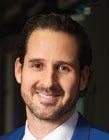
When you think of the great or emerging technological centers around the world, which come to mind? Singapore, Dubai, Tokyo, or Silicon Valley? Ireland, Israel or India? Daniel Pérez-Umaña, chief legal officer of banking conglomerate BAC|Credomatic, believes that as a result of fast-paced growth, increasing regulatory sophistication, and a rising generation of young talent, the next big tech hub could appear in Central America, with multinational corporations eying one country in particular: Costa Rica.
In spite of many economic and political challenges that lay ahead, this characteristically resilient region is in a pivotal moment, he explains. While most Central American countries still heavily rely on paper records for financial statements and legal documents, and a notary public is still preferred to DocuSign, some companies are taking the initiative and working with regulators to find compliant ways to implement new digital products.
From his office in San José, Costa Rica, Pérez-Umaña is helping lead a charge for technological progress within his company and his community, trying to build a foundation of legal precedent — one contract at a time — that he hopes will forever change the way that the BAC|Credomatic end users interact with digital banking products.
“You will be hearing a lot about technology coming out of Central America in the future. I’ve lived in Costa Rica for most of my life, and I’ve witnessed substantial growth with regard to the acceptance of digital products and solutions. If I can play a part in this, I will have done my job,” Pérez-Umaña says.
A new tech hub
In Costa Rica, Pérez-Umaña argues that change starts at a grassroots level. When BAC|Credomatic wants to create a new digital product, the legal department tries to come up with creative ways to improve upon existing (and sometimes outdated) legal frameworks.
To do that, sometimes he even implements “pilot campaigns” with projects that have some degree of probability of going to litigation. Digital signatures, for instance, are then used to see how certain jurisdictions will react. The process has been effective in showing BAC|Credomatic stakeholders that innovation does not always have to be synonymous with risk.
“We want to try this until we have sufficient evidence that these methods work to make our customers feel comfortable. However, we are very proud to say that we have the most advanced digital banking platform in the region, and we’re constantly looking for more opportunities to grow,” Pérez-Umaña says.
“My philosophy is that we’re legal architects and part of our job is to be creative.”
The company recently started two internal projects called “Virtual BAC” and “BAC +Simple,” which aim to streamline and digitize its banking processes to improve self-service platforms. This starts with the mobile banking app: the crown jewel of the company’s tech arsenal and the first digital banking app of its kind in the region.
“It’s funny when people tell me how advanced our mobile app is, because oftentimes I know that we’re about to throw it out and replace it with something even better,” he says.
In fact, BAC|Credomatic adds one or two new features to its online banking platform every day. With its mobile app and online banking platforms, BAC|Credomatic has created an interface where an employer in Costa Rica can manage its payroll or its treasury by seamlessly transferring funds to its employees or suppliers in any Central American country securely, efficiently, and in compliance with the region’s often disparate jurisdictional standards.
This is no simple feat. There are nine different countries under the BAC|Credomatic umbrella, and in three different regions (Central America, the Caribbean, and the southern tip of Florida) — each with their own standards, legal frameworks, and developing political systems. For Pérez-Umaña, hiring counsel who can provide strong local guidance is crucial to allowing him to focus on the broader issues.
“I cannot do this alone. Having a great team of regional and local in-house counsel has been very important in identifying risk areas and working with regulators to ensure that we don’t find ourselves violating the law; furthermore, interacting with and learning from other CLOs within the ACC network has helped me develop advanced tools and policies to adequately manage legal risk,” he explains.
Because many countries in Central America are still developing legislation around key issues such as data protection and antitrust law, remaining abreast of policy changes is a top-of-mind concern. At a moment’s notice, a regulator or the congress of a Central American country could set new standards, limitations, or requirements that have tangible repercussions on company operations. In moments like these, Pérez-Umaña explains that having adequate tools and solid pre-established relationships of trust and respect with regulators is essential to mitigating risk.
“My philosophy is that we’re legal architects and part of our job is to be creative. Our region is undergoing rapid change, and the legal department should be seen as partners in that change. As in-house counsel, you need to think quickly to use the frameworks that you’re given and build contractual solutions in order to remain innovative and keep legal risk under control,” Pérez-Umaña says.
Still, he remains hopeful that legislators in Central America will capitalize on the momentum that companies like BAC|Credomatic are creating and encourage future growth in the tech space.
Leading the charge
Pérez-Umaña began his professional career in Costa Rica, and argues that the culture that exists today is very different from the culture that existed when he started as an associate of Gómez & Galindo/Latamlex in March 2004. At the time, the path to in-house was few and far between, and most lawyers did not have a clear strategy for how to make the move from private practice.
“For the most part, only the biggest companies in Central America had legal departments with in-house counsel. Most high-level lawyers stayed in law firms because the in-house culture was not as sophisticated,” Pérez-Umaña explains.
After nearly a decade in private practice, with time intermittently spent completing two master’s degrees at Oxford and Harvard University, he received an unusual call from the CEO of one of his main clients with an interesting offer: Become the first CLO of BAC|Credomatic and help lead the charge for digital innovation in the region. To Pérez-Umaña, the opportunity to oversee complex regulatory and cross-border considerations in a rapidly emerging market was too good to refuse.
But when he started looking to other in-house counsel in the region for guidance, he quickly realized that Costa Rica lacked a strong in-house community. Now, he asserts, the community in Costa Rica is stronger than ever.
“Coming from a law firm, I didn’t know what strategies to follow or what tips to use, and I couldn’t find anything here in Central America — which is ultimately why I stumbled into ACC. But now, we’re starting to see real growth in the in-house culture here as more companies are starting to recognize the need for sophisticated legal departments and more cooperation options between GCs are being developed,” he explains.
“[W]e’re starting to see real growth in the in-house culture as more companies are starting to recognize the need for legal departments.”
“The [former] CEO of BAC|Credomatic always told me that he would only let me go back to private practice if I could leave him with a good team of experienced in-house counsel. In return, they would make it very hard for me to want to leave. As it turns out, they’ve been very good at that,” he jokes.
Getting to know… Daniel Perez-Umaña
DO YOU HAVE ANY HOBBIES? WHAT DO YOU DO IN YOUR SPARE TIME?
I have a lot of hobbies but my main hobby is music. Music has been my passion for as long as I can remember. I play guitar, I play piano, and I sing. I used to be in a reggae band for a while so I have fond memories. I still have a music room in my house and record stuff every now and then, it keeps me grounded. I also have been getting involved with MediFix, a social-entrepreneurship venture I co-founded with the aim of trying to make healthcare more affordable and accessible to people with no private insurance.
WHERE ARE YOU GOING FOR YOUR NEXT VACATION?
I am a huge soccer fan and I’m seriously considering going to Russia for the World Cup. But for my next vacation I am going with my girlfriend to Oxford for my 10-year reunion in May and then to a friend’s wedding in Punta Cana.
IF YOU COULD HAVE DINNER WITH ANYONE LIVING OR DEAD, WHO WOULD IT BE?
This is a tough one. You always think of the obvious answers like, who wouldn’t want to meet Jesus or John Lennon? But ultimately, I think it would be Leonardo da Vinci. He was such an innovator with such a broad set of interests. I think it would be great to chat with him about all the incredible discoveries and inventions of the past centuries.




